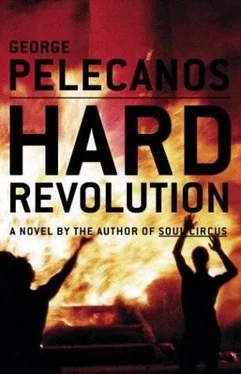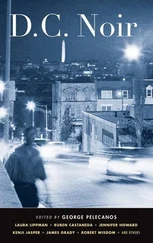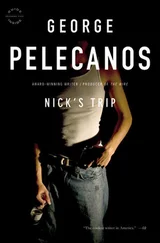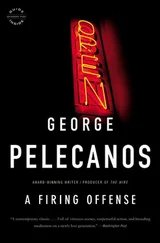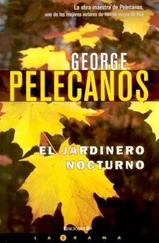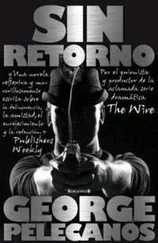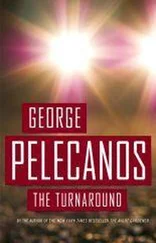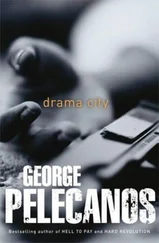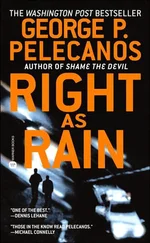“You been around forever,” said the cop, winking at his partner. “Any advice for this situation we got here?”
“Don’t shoot till you see the whites of their eyes.”
“That ain’t no trick.”
“You be safe, hear?”
The patrol cops drove off. Vaughn removed his hand from the receiver.
“Couple of cops,” said Vaughn into the phone. “Worried about the Hound Dog.”
“I’ve been worried about you, too,” said the woman on the other end of the line.
“Told you I’d call, didn’t I?”
“Sure, only…”
“What?”
“I wanna see you, Frank.”
Vaughn screwed a cigarette between his lips. “I could use a drink.”
“I’ll be waiting,” said Linda Allen, and she cut the line.
Vaughn stepped out of the booth and lit his smoke. He’d go home to Olga and the kid. But not yet.
THE SQUAD CAR continued north. The veterans drove by a young black cop, slowly walking up the long hill.
Derek Strange saw the squad car pass. He didn’t wave or acknowledge it. He crossed Georgia Avenue and walked west on Barry Place. He stopped at Carmen Hill’s row house and looked up at her apartment and saw that it was dark. He stared at the blackness behind her window and then he walked on.
Despite the curfew, people were out, sitting on their stoops, the younger ones gathered in alleys, some at street corners, leaning against lampposts or perched atop garbage cans. Some cold-eyed Strange. A few nodded in a friendly way. None spoke to him at all.
In his mind, Strange pictured his brother. Standing in the living room, trying to school his family on the revolution that had to come.
“You missed, D,” said Strange.
He wiped tears from his cheeks as a boy ran from an alley, carrying a dress over his shoulder. His eyes were wide as Strange reached out and grabbed his arm.
“What’re you doin’?” said Strange.
“I’m just funnin’,” said the boy. “This dress is for my moms.”
“Where’s your mother and father at? Didn’t they tell you there was a curfew?”
“I ain’t got no father, mister. My mother is out with a man.”
“Go home,” said Strange, releasing the boy’s arm. “Go home!”
The boy dropped the dress and fled. Strange walked on.
He turned right on 13th Street and went up the hill alongside Cardozo High, not looking at the smoldering ruins of Shaw behind him. At the top of the hill he came to his building and glanced up at his apartment. His windows were wide open. He tried to remember if he had left them that way when he had gone out last.
Strange started up to the door of his building, went for his key, and felt the roll of cash folded in the pants pocket of his uniform. He stood there for a moment at the door, thinking of the boy he’d just rousted. Thinking of all the boys he saw out here every day. Thinking of the baby boy whose father he’d just killed.
Strange returned to the sidewalk of 13th. He walked north, past Euclid, to Fairmont. West on Fairmont, he came to the row house with the turret and the peeling paint. He went inside and up to the second-floor landing. He knocked on a door there and waited.
The door opened to reveal the tall, heavy woman with the wide features and the almond-shaped eyes. She wore an old shirt and the “Black Is Beautiful” earrings he’d seen before. She held her baby boy in the crook of her arm.
“Mary,” said Strange. “Sorry to bother you so late.”
“You look rough.”
“Been workin’ damn near two days straight. Can I come in? I won’t stay but a minute.”
She stepped aside to let him pass through, then closed the door behind him. They stood there awkwardly in her small foyer. The apartment smelled of baby and cigarettes.
“You want a coffee, somethin’?”
“No, thank you,” said Strange, thinking of the cup she’d served coffee in before and the roach crawling on its saucer.
“Is this about Alvin again?” said Mary. “What, did you find him?”
“Looks like he’s gone,” said Strange. “I don’t think he’s coming back.”
“I’m not surprised.”
“Anyway,” said Strange, reaching into his pocket and retrieving the roll of cash. “I just came to give you this. It’s for your baby boy.”
Mary eyed the bills in Strange’s hand. “I don’t understand.”
“I took it off a suspect tonight,” said Strange. “Down in the trouble, on Seventh. Had to be stolen out the register of some store. I couldn’t keep it. And I couldn’t see turning it in. Now, I don’t mean to insult you, but… look, I know you can use it. You can use it to buy some things for your son.”
Her brow wrinkled in suspicion. “How much is it?”
“Count it,” he said, holding it out.
She hesitated for a moment.
“Hold my baby,” she said.
Strange exchanged the money for the child. Mary’s lips moved as she counted the bills. Strange looked down at the light-skinned baby boy staring up at him with odd golden eyes.
“There’s eight hundred dollars here.”
“It’s yours,” said Strange, still looking at the boy. “What do you call him?”
“Granville,” said Mary. “Granville Oliver. I gave him my last name.”
“He’s gonna be handsome,” said Strange.
“I hope he’ll be a fine young man,” said Mary Oliver, smiling at Strange for the first time. “Thank you for this.”
It ain’t nothin’ but blood money, thought Strange. Something to ease my conscience, is all it is.
“I better be gettin’ on,” said Strange.
GOING DOWN FAIRMONT, Strange took in the fragrance of a lilac bush growing against a fence. He turned right on 13th and walked the two blocks south to his building without looking over the crest of the big hill.
He went through the double glass doors and into the lobby, where groups of young people sat, talking and smoking cigarettes. They fell silent at the sight of him. He wondered if they knew that this was his last night as police.
“You’ve been given a responsibility, son. You do something to betray that, you don’t deserve to be wearing that uniform.”
Up on his floor, he stepped down the carpeted hallway, hearing music coming from behind the door of his apartment. As he arrived at his place, he put his ear against the door and listened to a familiar voice. Strange smiled.
It was Otis, with those ace session men behind him. “That’s How Strong My Love Is.” Volt single number 124.
Strange used his key to enter his apartment.
She was there by the open windows, wearing that light blue dress, the blue ribbon in her hair. Strange crossed the room and moved into her embrace, taking in the smell of her dime-store perfume. He kissed her mouth full, then said her name.
Below, in Shaw, lights glimmered faintly through the curtain of black smoke that hovered there and darkened the night sky. A breeze came in through the windows. Magnolias, dogwoods, and cherry trees had bloomed around the city. The scent of their flowers, and the smell of things burned and cleansed, was in the air.
Thanks to my friends Logan Deoudes and Jerome Gross, who gave me extensive, invaluable assistance during the research stages of Hard Revolution. Thanks go out as well to Dan Fein, Leonard Tempchin, Pete Glekas, Tim Thomas, Bob Fegley, Gary Phillips, Ruby Pelecanos, Bob Boukas, Paulina Garner, Billy Caludis, Frazier O’Leary, Mary Rados, Jim and Ted Pedas, Michael Pietsch, Reagan Arthur, Claire McKinney, Betsy Uhrig, and Alicia Gordon. In addition, I spoke to many active participants in the riots of April 1968 who will remain anonymous. Their candor and honesty was greatly appreciated.
As it has for me in the past, the Washingtoniana room of the MLK Library provided the tools and atmosphere I needed to write this novel. Ten Blocks from the White House, by Ben Gilbert and the staff of the Washington Post, provided the time line and factual backbone of the riot section of the book. Peter Guralnick’s Sweet Soul Music and Mark Opsasnick’s Capitol Rock gave me the music details I needed. The recordings of Otis Redding, O. V. Wright, the Impressions, James Carr, Wilson Pickett, Johnnie Taylor, and others gave me inspiration.
Читать дальше
